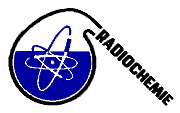Speaker
Mr
Nikolay Aksenov
(Flerov Laboratory of Nuclear Reactions, Joint Institute for Nuclear Research)
Description
Chemical identification of radionuclides in the decay chains of the recently discovered transactinide elements may serve as a method for confirming the discovery [1]. The longer half-lives of radionuclides of transactinides discovered in the An + 48Ca reactions expands the application of radiochemical techniques for their chemical characterization [2]. The method of cocrystallization can give valuable information on properties of transactinide compounds, not available in the macroscopic, therefore the identification of coprecipitation mechanism of lighter homologues of transactinides is of scientific interest.
Here we report the coprecipitation behavior of Ti, Zr, Hf and Th as lighter homologues of Rf with lanthanum fluoride. The kinetics of coprecipitation and distribution of group 4 elements between the liquid and solid phase, both preformed and formed during the distribution process, was studied as a function of concentration of the micro- and macrocomponent, foreign multivalent ions, HF, pH in solution. The solid phase of prepared samples was characterized by electron microscopy (SEM and TEM). The results show that the coprecipitation mechanism of Zr and Hf with LaF3 is different from Ti and Th and can be assigned to heterovalent isomorphism. A possibility of using coprecipitation with lanthanum fluoride for comparative investigation of the behavior of Rf in HF solutions was demonstrated.
This work was supported by the RFBR (grant No. 09-03-12029-ofi_m).
1. S. N. Dmitriev et al., Mendeleev Communications. 15, 1, 1-4 (2005).
2. Yu. Oganessian, J. Phys. G.: Nucl. Part. Phys. 34, R165-R242 (2007).
Primary author
Mr
Nikolay Aksenov
(Flerov Laboratory of Nuclear Reactions, Joint Institute for Nuclear Research)
Co-authors
Dr
Gospodin Bozhikov
(Flerov Laboratory of Nuclear Reactions, Joint Institute for Nuclear Research)
Prof.
Sergey Dmitriev
(Flerov Laboratory of Nuclear Reactions, Joint Institute for Nuclear Research)
Dr
Vyacheslav Lebedev
(Flerov Laboratory of Nuclear Reactions, Joint Institute for Nuclear Research)

